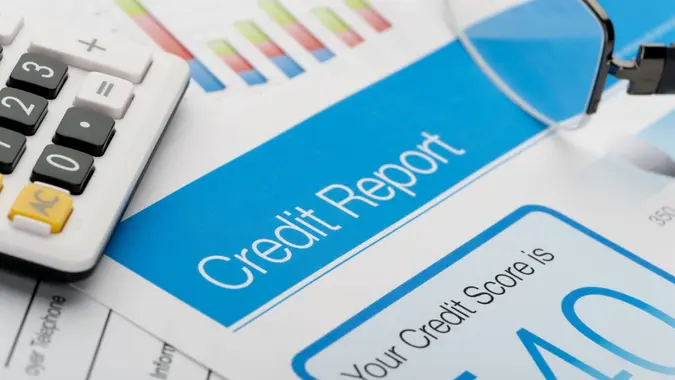How “Unscorable” Seniors Can Build Credit

Commitment to Our Readers
GOBankingRates' editorial team is committed to bringing you unbiased reviews and information. We use data-driven methodologies to evaluate financial products and services - our reviews and ratings are not influenced by advertisers. You can read more about our editorial guidelines and our products and services review methodology.

20 Years
Helping You Live Richer

Reviewed
by Experts

Trusted by
Millions of Readers
While thinking about this topic, I realized I am on my way to becoming an “unscorable” senior — a person who has no credit accounts or credit history by which a credit score can be generated — and it’s not a good thing.
If I become unscorable in my retiree years, it might put a crimp in my plans. I want to travel and live in other countries, and having good credit will allow me to charge more expensive purchases, like airline tickets, hotel reservations, rental cars and money exchanges, on my credit card. I also want to qualify to lease an apartment anywhere in this country or another. If the prospective landlord requires a credit check, I have to maintain a relationship with a bank.
Check out the 24 things you need to know to build your credit >>>
How a Zero Credit History Can Make You Unscorable
So, how am I at risk of becoming unscorable? Well, I’ve paid off my mortgage and plan to never have another one. I haven’t had a car loan since 1999, and all my cars are paid for. I pay for my kids’ college expenses out of my current income so none of us incur student loan debt. And, I don’t want to use my credit cards.
According to a 2013 FICO report on the unscorable population, credit files without any reported account activity in over six months are already considered “stale” by the FICO Score algorithm and are not scored.
Dos and Don’ts of Building Credit
Here’s what I’ve decided to do to build my credit history so I don’t become an unscorable senior (and what you can do if you’re already an unscorable senior).
1. DO keep two or three credit cards for a long time.
Even though I don’t use my credit cards much now, I’m not going to close the accounts. The credit bureaus keep a record of the age of my credit card accounts, and that age contributes positively to building and keeping a good credit score. If you haven’t used a credit card in many years, you might need to start with a secured credit card, which is backed by your own cash but still reports to the credit reporting agencies.
2. DON’T co-sign loans for adult kids or grandchildren.
One of the biggest mistakes a senior or retiree can make that can wreck their credit faster than you can say “sign here” is co-signing a loan for someone else. That’s because if the child or grandchild can’t pay, you will be liable for the entire loan amount. Because your income might be much lower than what it was during your working years, now is not the time to be taking on loan payments for someone else’s debts. If you co-sign loans, this will likely negatively affect your credit score and credit history if the debt ultimately falls to you.
Read: Why You Should Never Co-Sign for Your Kids
3. DO make small credit card charges, and pay the full balance by the due date.
I’m never going to carry a credit card balance. Instead, I will charge only small amounts I can pay off before the due date to keep my good payment history intact. This way the two most important positive credit score factors — good payment history and low amounts owed — are reported regularly to the credit bureaus.
4. DON’T take on a new mortgage, a reverse mortgage or a complete refinance.
You might think a reverse mortgage would build credit as a senior, but you’d be wrong. Instead, a reverse mortgage can create a huge amount of new debt that grows instead of decreases over time. Also, your credit score could be negatively affected. Similarly, don’t completely refinance or take a cash-out refinance on your mortgage. This replaces an old loan with good payment history with a brand new loan and fewer aged accounts. Acquiring new or building mortgage debt into your senior years when your income might be lower and health costs might be higher can put a serious strain on your budget, leading to late or missed payments.
5. DO use credit cards regularly and responsibly.
I’m going to keep my credit card utilization ratio (how much I charge compared to how much credit is available to me) low, below 10 percent. If you keep a credit card at 0 percent utilization for a long time, credit card companies could close the accounts on you, which does not help you build credit or show you have a good payment history.
As a senior, you still want to be able to access credit if you want it, so do the minimum amount to remain scorable.
 Written by
Written by 
























